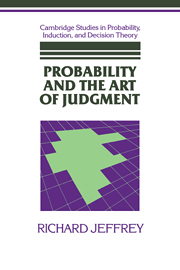Book contents
- Frontmatter
- Contents
- Preface
- 1 Introduction: Radical probabilism (1991)
- 2 Valuation and acceptance of scientific hypotheses (1956)
- 3 Probable knowledge (1968)
- 4 Probability and the art of judgment (1985)
- 5 Bayesianism with a human face (1983)
- 6 Alias Smith and Jones: The testimony of the senses (1987)
- 7 Conditioning, kinematics, and exchangeability (1988)
- 8 Preference among preferences (1974)
- 9 On interpersonal utility theory (1971)
- 10 Remarks on interpersonal utility theory (1974)
- 11 Mises redux (1977)
- 12 Statistical explanation vs. statistical inference (1969)
- 13 New foundations for Bayesian decision theory (1965)
- 14 Frameworks for preference (1974)
- 15 Axiomatizing the logic of decision (1978)
- 16 A note on the kinematics of preference (1977)
6 - Alias Smith and Jones: The testimony of the senses (1987)
Published online by Cambridge University Press: 05 June 2012
- Frontmatter
- Contents
- Preface
- 1 Introduction: Radical probabilism (1991)
- 2 Valuation and acceptance of scientific hypotheses (1956)
- 3 Probable knowledge (1968)
- 4 Probability and the art of judgment (1985)
- 5 Bayesianism with a human face (1983)
- 6 Alias Smith and Jones: The testimony of the senses (1987)
- 7 Conditioning, kinematics, and exchangeability (1988)
- 8 Preference among preferences (1974)
- 9 On interpersonal utility theory (1971)
- 10 Remarks on interpersonal utility theory (1974)
- 11 Mises redux (1977)
- 12 Statistical explanation vs. statistical inference (1969)
- 13 New foundations for Bayesian decision theory (1965)
- 14 Frameworks for preference (1974)
- 15 Axiomatizing the logic of decision (1978)
- 16 A note on the kinematics of preference (1977)
Summary
Probabilistic accounts of judgment can disappoint dogmatically rooted expectations, i.e., expectations rooted in cases where simple acceptance and rejection are appropriate attitudes toward hypotheses, and where evidence can be expected to simply verify or falsify hypotheses. But probabilistic judgment, freed from the two endpoints, can rate hypotheses anywhere in the unit interval, and can do the same for evidence itself. Where the reliability of signs and witnesses is an issue, dogmatism must in some measure take account of probabilistic considerations; but the risk of paradox is then extreme. Here is such a case, presented as an epistemological parable that can also be read as a parable of scientific hypothesis-testing.
THE PROBLEM
H is the hypothesis that it's hot out. Smith and Jones have each testified as to H's truth or falsity, but you don't regard their testimony as completely reliable. Perhaps you're not even quite sure what either of them said. (You are deep in a tunnel, into which they have shouted their reports.) Let E and F be the propositions that Smith and Jones, respectively, said that it's hot. How can you represent your judgment about E and F, and your consequent judgment about H?
CLEAR TESTIMONY
Let's start with the relatively simple case where there's no doubt about what was said. Here it's appropriate to treat the evidence dogmatically, as a matter of learning the truth values of E and F.
- Type
- Chapter
- Information
- Probability and the Art of Judgment , pp. 108 - 116Publisher: Cambridge University PressPrint publication year: 1992



